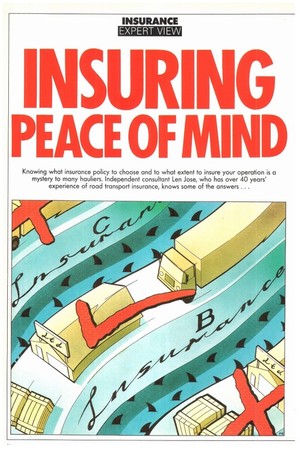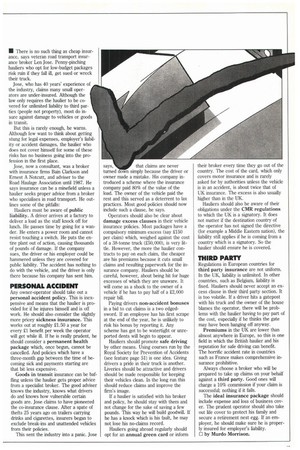NSUR NG PEACE OF MIND
Page 66

Page 67

If you've noticed an error in this article please click here to report it so we can fix it.
• There is no such thing as cheap insurance, says veteran road transport insurance broker Len Jose. Penny-pinching hauliers who opt for low-budget packages risk ruin if they fall ill, get sued or wreck their truck.
Jose, who has 40 years' experience of the industry, claims many small operators are under-insured. Although the law only requires the haulier to be covered for unlimited liability to third parties (people not property), most do insure against damage to vehicles or goods in transit.
But this is rarely enough, he warns. Although few want to think about getting stung for legal expenses, employer's liability or accident damages, the haulier who does not cover himself for some of these risks has no business going into the profession in the first place.
Jose, now a consultant, was a broker with insurance firms Bain Clarkson and Ernest A Notcutt, and adviser to the Road Haulage Association until 1987. He says insurance can be a minefield unless a haulier seeks proper advice from a broker who specialises in road transport. He outlines some of the pitfalls:
Hauliers must be aware of public liability. A driver arrives at a factory to deliver a load as the staff knock off for lunch. He passes time by going for a wander. He enters a power room and cannot resist touching a switch. He puts the entire plant out of action, causing thousands of pounds of damage. If the company sues, the driver or his employer could be hammered unless they are covered for public liability. The accident has nothing to do with the vehicle, and the driver is only there because his company has sent him.
Any owner-operator should take out a personal accident policy. This is inexpensive and means that the haulier is provided for if he injures himself and is off work. He should also consider the slightly more pricey sickness insurance. This works out at roughly 21.50 a year for every £1 benefit per week the operator will get while ill. If he is really prudent, he should consider a permanent health package which, once begun, cannot be cancelled. And policies which have a three-month gap between the time of becoming sick and payments starting are that bit less expensive.
Goods in transit insurance can be baffling unless the haulier gets proper advice from a specialist broker. The good adviser knows the industry, knows what drivers do and knows how vulnerable certain goods are. Jose claims to have pioneered the co-insurance clause. After a spate of thefts 25 years ago on trailers carrying drinks and cigarettes, insurers began to exclude break-ins and unattended vehicles from their policies.
This sent the industry into a panic. Jose says, that claims are never turned 'own simply because the driver or owner made a mistake. His company introduced a scheme where the insurance company paid 80% of the value of the load. The owner of the vehicle paid the rest and this served as a deterrent to lax practices. Most good policies should now include such a clause, he says.
Operators should also be clear about damage excess clauses in their vehicle insurance policies. Most packages have a compulsory minimum excess (say £150 per claim) which, weighed against the cost of a 38-tonne truck (.250,000), is very little. However, the more the haulier contracts to pay on each claim, the cheaper are his premiums because it cuts small claims and resulting paperwork for the insurance company. Hauliers should be careful, however, about being hit for huge excesses of which they are unaware. It will come as a shock to the owner of a vehicle if he has to pay half of a £2,000 repair bill.
Paying drivers non-accident bonuses in a bid to cut claims is a two edgedsword. If an employee has his first scrape at the end of the year, he is unlikely to risk his bonus by reporting it. Any scheme has got to be watertight or unreported dents will begin to appear.
Hauliers should promote safe driving by other means. Using courses run by the Royal Society for Prevention of Accidents (see feature page 51) is one idea. Giving drivers a pride in their truck is another. Liveries should be attractive and drivers should be made responsible for keeping their vehicles clean. In the long run this should reduce claims and improve the firm's image.
If a haulier is satisfied with his broker and policy, he should stay with them and not change for the sake of saving a few pounds. This way he will build goodwill. If he has a knock which is his fault, he may not lose his no-claims record.
Hauliers going abroad regularly should opt for an annual green card or inform their broker every time they go out of the country. The cost of the card, which only covers motor insurance and is rarely asked for by authorities unless the vehicle is in an accident, is about twice that of UK insurance. The excess is also usually higher than in the UK.
Hauliers should also be aware of their obligations under the CMR regulations to which the UK is a signatory. It does not matter if the destination country of the operator has not signed the directive (for example a Middle Eastern nation), the liability still applies if he is coming from a country which is a signatory. So the haulier should ensure he is covered.
Regulations in European countries for third party insurance are not uniform. In the UK, liability is unlimited. In other countries, such as Belgium, liability is fixed. Hauliers should never accept an excess clause in their third party section. It is too volatile. If a driver hits a gatepost with his truck and the owner of the house blames the operator, there will be problems with the haulier having to pay part of the cost, especially if he thinks the gate may have been hanging off anyway.
Premiums in the UK are lower than almost anywhere in Europe, so this is one field in which the British haulier and his reputation for safe driving can benefit. The horrific accident rate in countries such as France makes comprehensive insurance prohibitive.
Always choose a broker who will be prepared to take up claims on your behalf against a third party. Good ones will charge a 10% commission if your claim is successful; nothing if it fails.
The ideal insurance package should include expense and loss of business cover. The prudent operator should also take out life cover to protect his family and secure a retirement nest egg. If an employer, he should make sure he is properly insured for employer's liability.
0 by Murdo Morrison.
























































































































